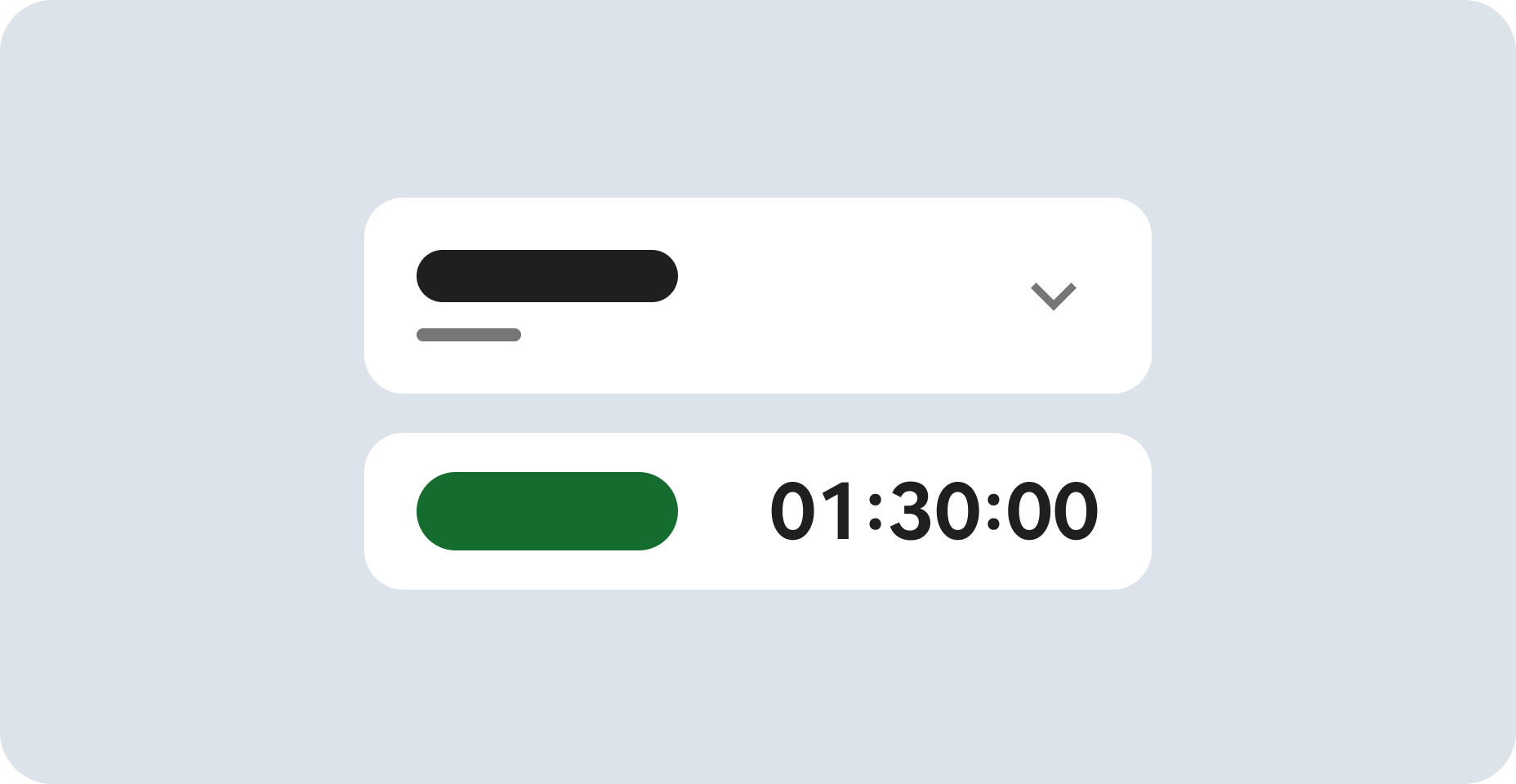
Before you begin
- Labs create a Google Cloud project and resources for a fixed time
- Labs have a time limit and no pause feature. If you end the lab, you'll have to restart from the beginning.
- On the top left of your screen, click Start lab to begin
Launch Vertex AI Workbench instance
/ 20
Clone a course repository within a Vertex AI Workbench instance
/ 20
Create a BigQuery dataset
/ 15
Create a BQML model to predict user churn
/ 15
Evaluate BQML model
/ 15
Batch predict user churn
/ 15
In this lab, you will train, tune, evaluate, explain, and generate batch and online predictions with a BigQuery ML XGBoost model. You will use a Google Analytics 4 dataset from a real mobile application, Flood it! (Android app, iOS app), to determine the likelihood of users returning to the application. You will generate batch predictions with your BigQuery ML model as well as export and deploy it to Vertex AI for online predictions using the Vertex AI Python SDK.
BigQuery ML lets you train and do batch inference with machine learning models in BigQuery using standard SQL queries faster by eliminating the need to move data with fewer lines of code.
Vertex AI is Google Cloud's complimentary next generation, unified platform for machine learning development. By developing and deploying BigQuery ML machine learning solutions on Vertex AI, you can leverage a scalable online prediction service and MLOps tools for model retraining and monitoring to significantly enhance your development productivity, the ability to scale your workflow and decision making with your data, and accelerate time to value.
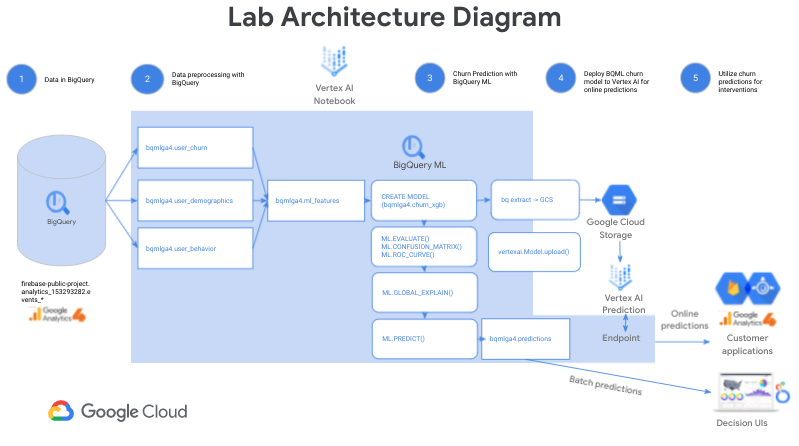
This lab is inspired by and extends Churn prediction for game developers using Google Analytics 4 (GA4) and BigQuery ML. Read the blog post and accompanying tutorial for additional depth on this use case and BigQuery ML.
In this lab, you will go one step further and focus on how Vertex AI extends BigQuery ML's capabilities through online prediction so you can incorporate both customer churn predictions into decision making UIs such as Looker dashboards but also online predictions directly into customer applications to power targeted interventions such as targeted incentives.
In this lab, you learn how to:
Read these instructions. Labs are timed and you cannot pause them. The timer, which starts when you click Start Lab, shows how long Google Cloud resources are made available to you.
This hands-on lab lets you do the lab activities in a real cloud environment, not in a simulation or demo environment. It does so by giving you new, temporary credentials you use to sign in and access Google Cloud for the duration of the lab.
To complete this lab, you need:
Cloud Shell is a virtual machine that is loaded with development tools. It offers a persistent 5GB home directory and runs on the Google Cloud. Cloud Shell provides command-line access to your Google Cloud resources.
Click Activate Cloud Shell 
Click through the following windows:
When you are connected, you are already authenticated, and the project is set to your Project_ID,
gcloud is the command-line tool for Google Cloud. It comes pre-installed on Cloud Shell and supports tab-completion.
Output:
Output:
gcloud, in Google Cloud, refer to the gcloud CLI overview guide.
In the Google Cloud console, from the Navigation menu (
Click Enable All Recommended APIs.
On the left-hand side, click Workbench.
At the top of the Workbench page, ensure you are in the Instances view.
Click 
Configure the Instance:
Your terminal window will open in a new tab. You can now run commands in the terminal to interact with your Workbench instance.
Click Check my progress to verify the objective.
Click Check my progress to verify the objective.
Open the notebook file lab_exercise.ipynb.
In the Define constants section, update your REGION variable with the
Continue the lab in the notebook, and run each cell by clicking the Run (
Read the narrative and make sure you understand what's happening in each cell. As you progress through the lab notebook, return back to these instructions to complete the graded exercises.
Click Check my progress to verify the objective.
Click Check my progress to verify the objective.
Click Check my progress to verify the objective.
Click Check my progress to verify the objective.
In this lab you trained, tuned, explained, and deployed a BigQuery ML user churn model to Vertex AI to generate high business impact batch and online churn predictions to target customers likely to churn with interventions such as in-game rewards and reminder notifications.
Read more about Vertex AI in the Vertex AI Documentation.
...helps you make the most of Google Cloud technologies. Our classes include technical skills and best practices to help you get up to speed quickly and continue your learning journey. We offer fundamental to advanced level training, with on-demand, live, and virtual options to suit your busy schedule. Certifications help you validate and prove your skill and expertise in Google Cloud technologies.
Manual Last Updated December 30, 2024
Lab Last Tested December 30, 2024
Copyright 2025 Google LLC All rights reserved. Google and the Google logo are trademarks of Google LLC. All other company and product names may be trademarks of the respective companies with which they are associated.



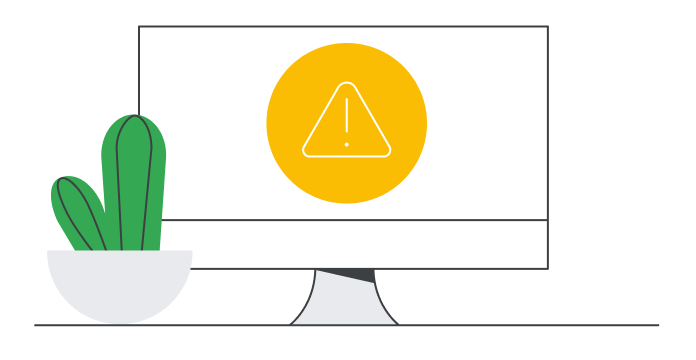
This content is not currently available
We will notify you via email when it becomes available
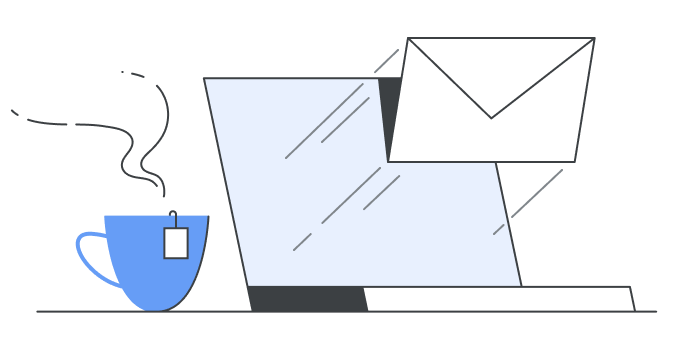
Great!
We will contact you via email if it becomes available

One lab at a time
Confirm to end all existing labs and start this one
